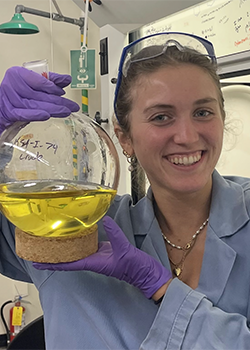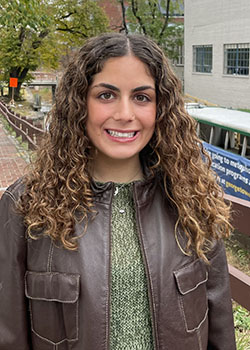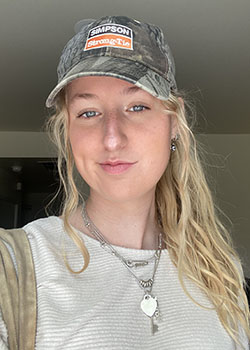Meet some of our biochemistry majors.
Kate Amsden
Ava Arabshahi
Tilly Lobdell

Kate Amsden
Hometown: Boston, MA
Major: biochemistry minor: French
Can you describe your working relationships with biochemistry professors? Any standout classes you’ve taken?
I've found all the professors in the bio/chem/biochem departments to be incredibly supportive. There are professors that I haven't even had classes with that I'm on a first-name basis with just because I've worked with them through student tutor services or they've stopped in the lab to say hi. I had Prof. Navarro for O-Chem 1 and Prof. Cannon for O-Chem 2, both classes that I loved and that made me more invested in pursuing organic chemistry research as a profession. I also took physical organic chemistry with Prof. Cannon, which was probably one of the most difficult but fun classes I've taken at Oxy.
I traveled to San Diego last fall to present research at a poster conference hosted by Bristol Myers Squibb. This research will hopefully be published within this academic year with myself as the first author.
Have you taken part in any student research opportunities through Oxy?
Research has been a major component of my time at Oxy. I started working in the Navarro Group spring of my first year, and have worked every summer and semester since then. I was a part of the Research Early Access Program (REAP) the summer after my first year, which funds 10 weeks of research in a lab at Oxy with the goal of introducing students to research early and retaining them in labs. The following summer I joined a collaboration with the Sigman Group at the University of Utah and got to travel there with Prof. Navarro to work in their lab for two weeks. At the end of the summer, the Navarro Group published our latest paper, on which I was a co-author.
Last summer, my research was funded through a prestigious national fellowship called the American Chemical Society Division or Organic Chemistry Summer Undergraduate Research Fellowship, which funded 10 weeks of summer research. I then traveled to San Diego last fall to present that research at a poster conference hosted by Bristol Myers Squibb. This research will hopefully be published within this academic year with myself as the first author. I've also had the opportunity to present my research at several national conferences such as the American Chemical Society Annual Conference and the NSF Center for Computer-Assisted Synthesis Annual Meeting. This fall, I will be presenting a poster at the ACS Western Regional Meeting with support from Occidental’s Undergraduate Research Center in the form of the ASP Conference Travel Grant, which provided financial support for travel and board.
Now, as I am applying to graduate programs, I am confident in not just my abilities as a researcher with the tools I need to succeed in a Ph.D. program, but also in my soft skills.
What are your ambitions post-Oxy and how has the liberal arts approach helped to put you on this path?
This fall I am preparing applications for graduate programs in organic chemistry. Following my Ph.D., I am planning on pursuing a career as a synthetic chemist in the pharmaceutical industry. As a biochemistry major, there is significant overlap in the areas of study within the major with current research in pharmaceutical development. Even though I consider myself an organic chemist, it is essential to be able to apply the chemistry I perform to biological systems containing complex molecular interactions, which is the basis of all drug therapies.
There really are so many aspects in which the liberal arts approach has supported me. The largest advantage I've discovered is that I've had the opportunity to start researching very early and become completely independent in the lab through years of experience. While I am the lead researcher on my project, setting up reactions by myself and planning the course of my project, that is not the case at other institutions where graduate students are the main contributors to the academic research. Additionally, I've reaped the benefits of working one-on-one with my PI, Prof. Navarro. He has been an incredible mentor, deeply invested in the success of each of his students. Throughout my time in his lab, he has encouraged me to submit abstracts to conferences, present my work, write fellowship proposals, and mentor other students. He has provided feedback and supported me at every setback and challenge.
This is unique not just to liberal arts schools, but specifically to Occidental, where the professors truly want to take the time to get to know their students and be involved in the undergraduate experience. Now, as I am applying to graduate programs, I am confident in not just my abilities as a researcher with the tools I need to succeed in a Ph.D. program, but also in my soft skills. I know that I can set up the reactions and also communicate the importance of my work to a nonscientific audience through either oral presentation or written proposals.

Ava Arabshahi
Hometown: Seattle, WA
Major: biochemistry minor: public health
What was your motivation to major in biochemistry?
I first learned about CRISPR, the gene-editing tool, in middle school, and that moment sparked my fascination with medicine and biomedical research. It inspired me to explore how technology can transform health sciences and deepened my curiosity about the intersections of biology, chemistry, and innovation. Loving both biology and problem-solving, I came to appreciate chemistry as the “how” of biology, which naturally led me to biochemistry.
[Doing research at Oxy] has been transformative—I’ve gained technical and analytical skills, presented at a conference, and co-authored a journal paper.
Have you taken part in any student research opportunities through Oxy?
Since my first year at Oxy, I’ve worked in Prof. Udit’s lab to develop electrochemical methods for catalyzing the cytochrome P450 enzyme, aiming to make drug synthesis more sustainable and cost-effective. This experience has been transformative—I’ve gained technical and analytical skills, presented at a conference, and co-authored a journal paper. Additionally, I joined Dr. Abdala Elkhal’s Neuro-Cardio-Immunology Lab at the Huntington Medical Research Institutes through Oxy’s InternLA program, studying the role of NAD⁺ in immune regulation and inflammation via translational research techniques. I’m grateful to continue research with both mentors this year; they have helped me grow as a person, student, and scientist, and have been instrumental in shaping my career goals.
What are your ambitions post-Oxy and how has the liberal arts approach helped to put you on this path?
My goal is to pursue an MD/Ph.D. and build a career as a physician-scientist, bridging biomedical research and patient care. I intentionally chose a liberal arts school for its student-centered approach, opportunities to form meaningful relationships with faculty, and its holistic education that empowers students to become agents of change in their fields. Oxy’s interdisciplinary mission has taught me to think critically, communicate across disciplines, and recognize the human context of scientific problems.
Oxy’s interdisciplinary mission has taught me to think critically, communicate across disciplines, and recognize the human context of scientific problems.
What is the vibe of the biochemistry department?
The biochemistry department is close-knit and collaborative, with professors who are approachable, deeply invested in students’ success, and eager to mentor. Peers support each other in labs, study groups, and beyond, which makes even the most challenging coursework rewarding. It’s a community where everyone wants you to thrive, and where relationships with faculty often grow into lasting connections.

Tilly Lobdell
Hometown: Geneva, IL
Major: biochemistry
Can you describe your working relationships with biochemistry professors? Are there any standout classes you’ve taken?
I have great relationships with my biochemistry professors. They’re all incredibly helpful and really care about their students’ success, inside and outside the classroom. I have gotten lunch with my professors and often go to talk to them about a wide variety of things, from help with classes to post-grad planning! As far as standout classes in the major, my favorites have been Chem 350 (Biochemistry II) with Prof. Shende and Physical Organic Chemistry with Prof. Cannon!
Research has been the highlight of my experience at Oxy—I love my labmates, the work I get to do, and I have gotten incredible mentorship!
Have you taken part in any student research opportunities at Oxy?
Yes, I spent two years conducting neurobiology research with Prof. Thompson in the biology department before transitioning to natural products biochemistry research with Prof. Shende in the chemistry department, and I also participated in the URC’s Summer Research Program. Our research focuses on developing new approaches and methods for using enzymes, proteins that catalyze chemical reactions to synthesize natural products, which are small molecules found in nature that often have novel biological or pharmaceutical properties. Research has been the highlight of my experience at Oxy—I love my labmates, the work I get to do, and I have gotten incredible mentorship!
The relationships I was able to have with my professors due to Oxy’s small class size allowed me to realize that I wanted to do for other students what my professors did for me—inspire, guide, and help them love biochemistry.
What are your ambitions post-Oxy and how has the liberal arts approach helped to put you on this path?
Post-Oxy, I’m hoping to go to graduate school to earn my Ph.D. in biochemistry, doing natural products biosynthesis and biocatalysis. Eventually, I want to become a professor to continue doing research and to teach biochemistry. The relationships I was able to have with my professors due to Oxy’s small class size allowed me to realize that I wanted to do for other students what my professors did for me—inspire, guide, and help them love chemistry/biochemistry. Also, the liberal arts allowed me to have hands-on experience with research, which sparked my love of it and my interest in pursuing a graduate research degree.
What is the vibe of the biochemistry department?
The vibe of the biochemistry department is definitely very close-knit, fun, and driven! The major isn’t huge, so everyone knows each other through things like classes, research, and involvement in the department through SSAP, AMP, or serving as a teaching assistant. There’s a great sense of community and definitely an emphasis on collaboration as opposed to being super competitive with each other.
To see more Meet Our Majors profiles, visit the main page.
